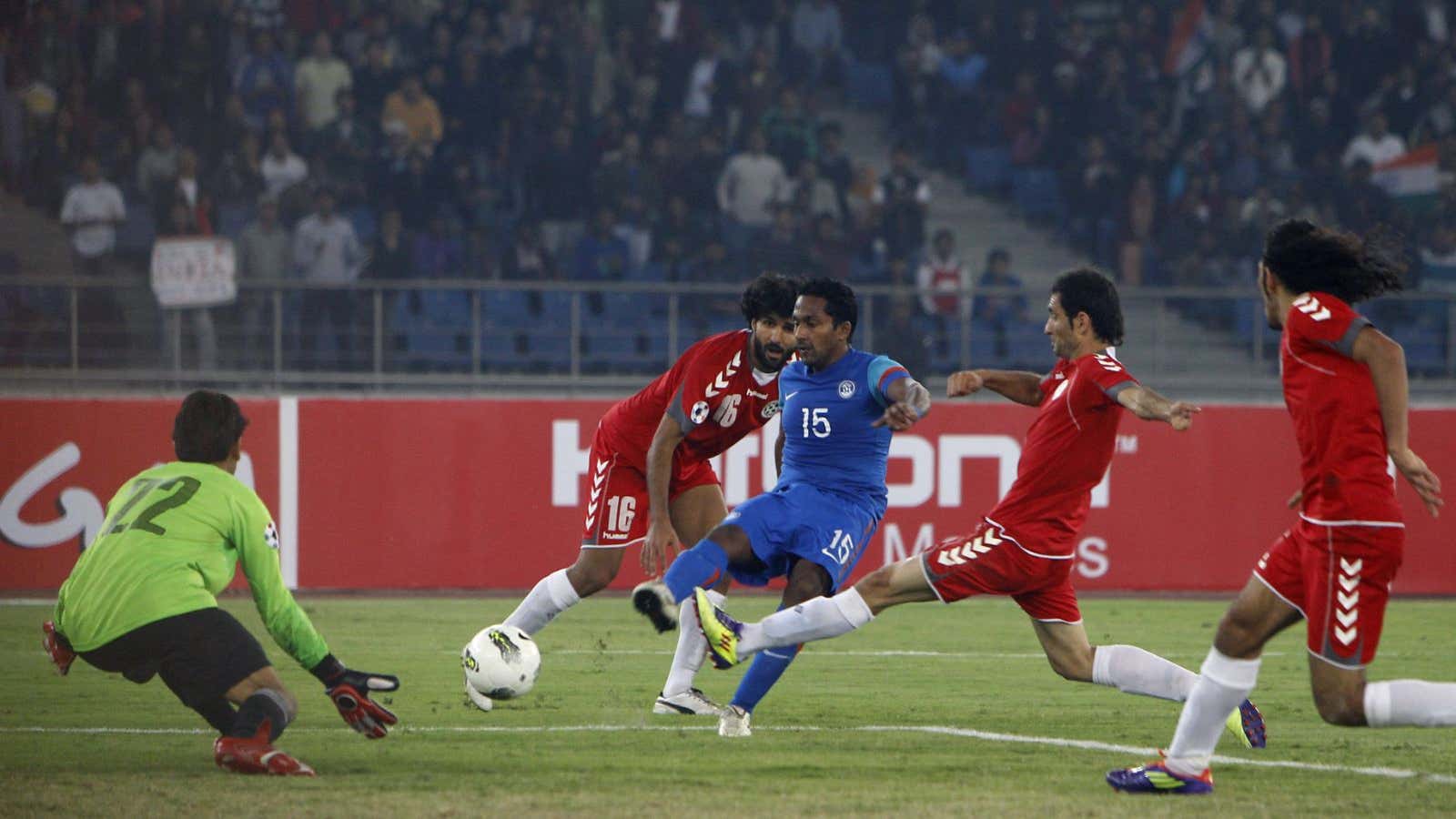Back in the summer of 2014, Rwanda defeated DR Congo 4-3 in a penalty shootout and secured a place in group A of the African Cup of Nations qualifiers with South Africa, Nigeria and Sudan. On the touchline, Stephen Constantine beamed: the training work on team shape, positioning and set pieces had shown during the game. It was an excellent result for the “Wasps.”
But then came a nasty shock for Constantine: the Confederation of African Football banned Rwanda for fielding Daddy Birori, who played as Etakiama Agiti Tady for Vita Club in DR Congo. There, he had a Congolese passport and a different date of birth.
Constantine was livid. “It was a complete shock,” he told Quartz. “We were disqualified on a technical issue, the same issue (that) was raised by Libya.” His team would thus not go on to participate in this month’s African Cup of Nations, but Constantine’s positive work did not go unnoticed—he took Rwanda to the 68th place on the FIFA ranking.
Last week, the All India Football Federation (AIFF) disclosed the Englishman as the new coach of the Blue Tigers, India’s national football team. “Mr. Constantine will also be in charge of the India U-23 National Team,” the AIFF stated in a press release.
The head coach’s job had become vacant in October when Wim Koevermans resigned after disappointing results with India. Speculation about Koevermans’s successor was rife: the legendary Zico from Brazil? A European coach perhaps? The AIFF shortlisted Constantine together with Kiwi Richard Herbert, the coach of Northeast United FC, for the top job in Indian football—but the federation was swayed by Constantine’s vast experience.
In point of fact, Constantine has managed more national teams than the late Sir Bobby Robson. He has coached from the foothills of the Himalayas in Nepal to the dusty fields of Lilongwe in Malawi. In Sudan, Constantine was assigned an armed guard to go scout a left-back and in Turkmenistan, a tourist-trip provoked an angry response from police with bayonets.
“I think understanding how people work and think around the world helps me to connect with the players,” said Constantine. “They know that I have been to many countries and that I understand the differences in the learning process of some players. It also allows me to understand where they are coming from.”
Moreover, the 52-year-old coached India from 2002-2005. The Blue Tigers were a commendable outfit, winning the LG Cup and finishing runners-up at the Afro-Asian games. And Constantine improved India’s position on the FIFA ranking drastically, taking the team from a lowly 168th to a respectable 129th.
Ironically, India are now ranked even lower. “It’s not been a good year from a national team perspective,” Constantine admitted. “Their FIFA ranking of 171 (just below Sao Tome and Principe) is a reflection of that. It’s sad that India has not gone on to better things.”
Still, the Indian football landscape has changed from Constantine’s first spell in charge. India have won the Nehru Cup, the AFC Challenge Cup and participated in the 2011 Asian Cup in Qatar. The ISL (Indian Super League) has boomed in its inaugural season, whereas the I-League seems anemic. Does Constantine still have the requisite knowledge of the Indian game?
The new year offers a window of opportunity for the reappointed coach and his wards with the Asian Cup and World Cup qualifiers on the fixture list. For India, the World Cup is a distant dream, while the 2019 Asian Cup represents an ambitious and challenging goal. At first, Constantine will strive to climb the FIFA ranking.
He will seek to do so with an open-minded approach. The Londoner of Greek-Cypriot descent is an advocate for attacking, free-flowing football, something his predecessor failed to deliver. Constantine has watched Arsene Wenger instruct his players at Arsenal and has visited Vicente Del Bosque to bolster his knowledge about ‘Tiki-Taka.’
“Ferguson, Lippi, Ancelotti and Mourinho are famous, but there are a lot of great coaches who don’t win titles: the work Sam Allardyce has done at Bolton and now West Ham—it is not easy to compete with the big teams and the money they have to spend; the coach of Costa Rica (Jorge Pinto) did a great job at the last World Cup,” Constantine said. “It is not always about winning trophies, it is about getting the absolute maximum out of your players.”
There is a bit of self-reflection hidden in Constantine’s words: he doesn’t crave fame, but recognition back home in England. In 2005, Constantine was the first-team coach at Millwall FC, but the club was relegated to League One the same season. His name has been mooted at Gillingham and Woking, but Constantine very much remains a nomad in the periphery of English football.
The inveterate globetrotter’s immediate concern is scouting players in the I-League and taking a look back at the standout performers in the ISL. That way he will get a sense of the personnel he will want to use in the future to kick-start a new era in Indian football.
